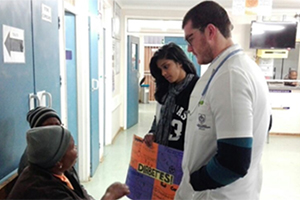
Two fourth-year students, Nicolle Pierce (left)
and Grant Connellan, give a health promotion
to community members at a local clinic in
Trompsburg.
Photo: Supplied
In 2014, the World Health Organization reported that non-communicable diseases are the leading cause of death in South African communities. These diseases can be attributed to lifestyle habits such abuse of alcohol and tobacco, an unhealthy diet and high salt intake, as well as physical inactivity.
With a vision to improve health outcomes in communities in Free State, the Faculty of Health Sciences at the University of the Free State has piloted the Community-Based Education (CBE) programme for its undergraduate students. The programme combines education and practice to produce well-rounded future healthcare professionals.
Students experience challenges of rural healthcare services
Students work with local health workers to identify health needs within communities. The programme highlights the possibilities presented by community-based education, and exposes students to the challenges of rural life and make a lasting impact.
“Our clinical experience truly exposed us to the limitations that health professionals, operating in this environment, are faced with. The primary healthcare setting is vastly different to the one, which we as students, are exposed to on a daily basis”, said a fourth-year student who participated in the programme.
Chance to bring holistic healing to communities
On their rotations, students focus on screening and health education, assessing child healthcare, antenatal and general adult healthcare. They are also required to identify households in need of assistance, bringing holistic care to communities in need.
A hope for positive results and a lasting legacy
The coordinators of the CBE programme, believe that it will produce well-rounded professionals who will apply the skills they’ve learned in and outside the classroom to begin to improve healthcare services rendered in communities and healthcare facilities.